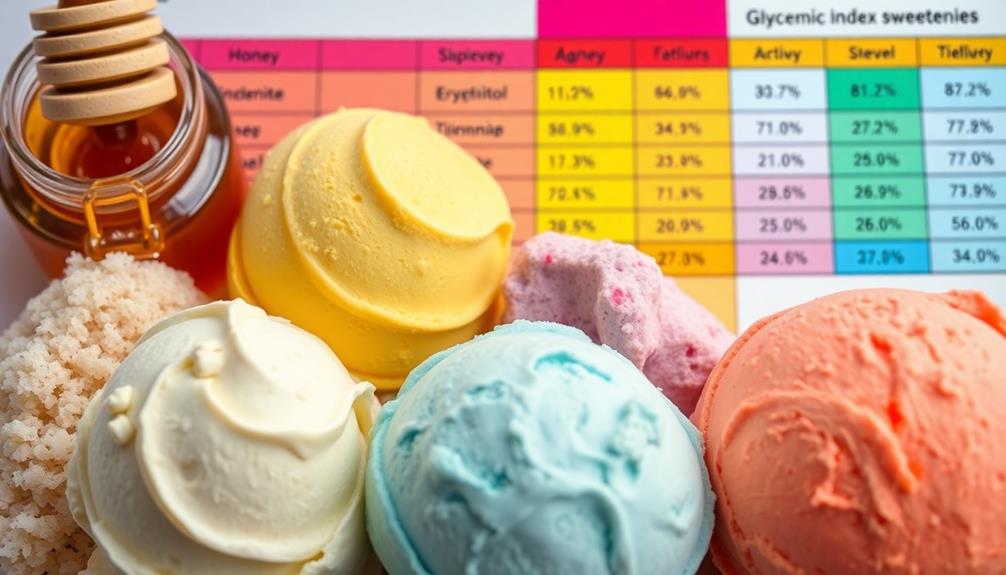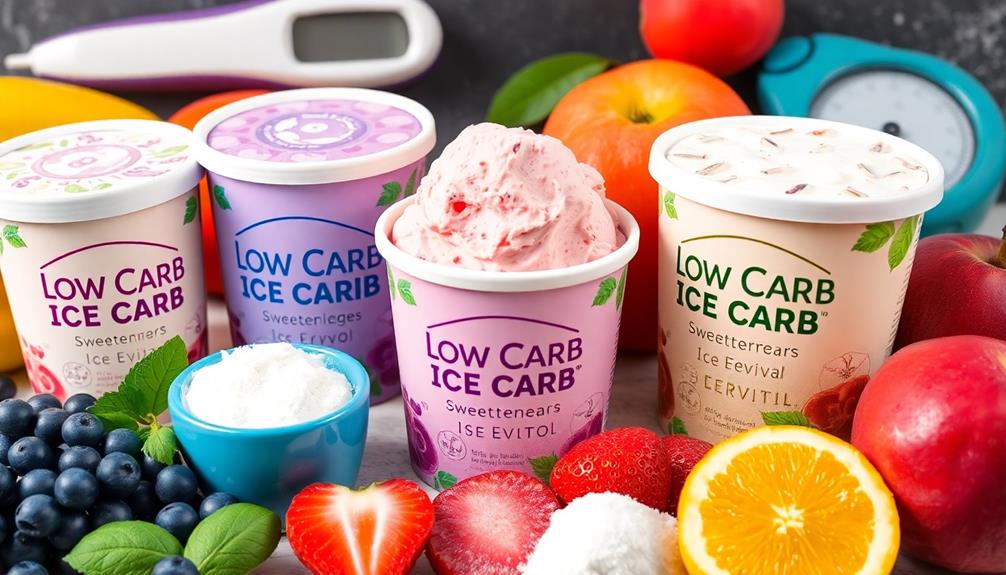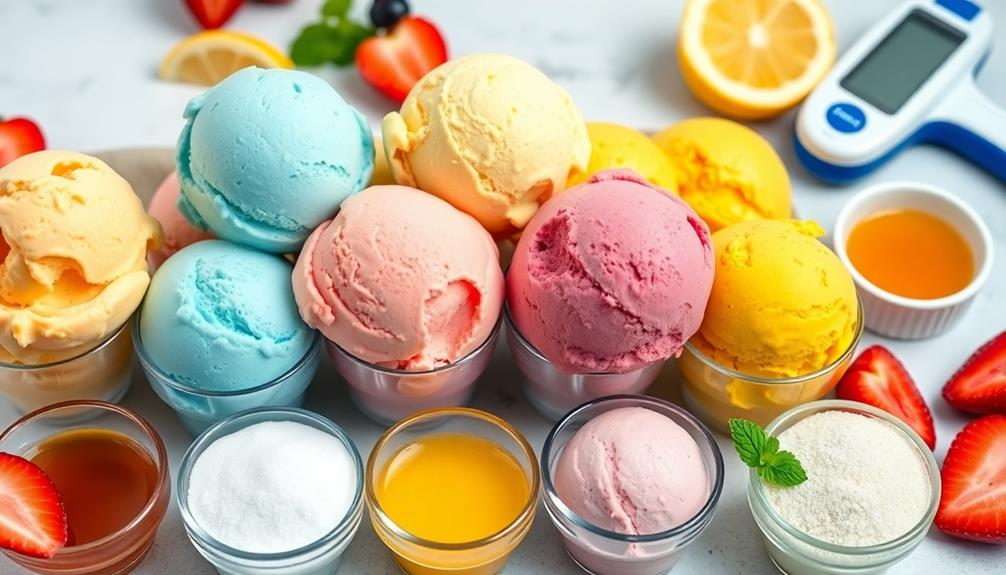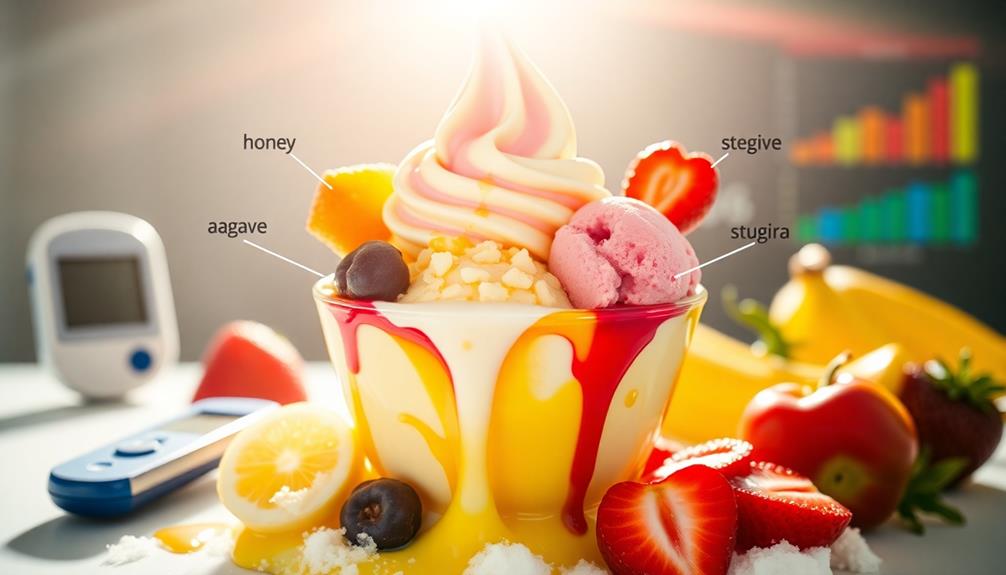Different sweeteners in ice cream can really affect your blood sugar levels. For instance, natural sweeteners like stevia and monk fruit have little to no impact, while regular sugars, like sucrose, can cause rapid spikes. Sugar alcohols, such as erythritol, also keep your blood sugar stable with minimal calories. Artificial sweeteners, like aspartame, generally don't influence blood glucose levels much either. When choosing ice cream, look for brands that use low-carb sweeteners and keep an eye on serving sizes. There's more to discover about which options best suit your taste and health goals.
Key Takeaways
- Natural sweeteners like stevia and monk fruit have a glycemic index of 0, minimizing blood sugar spikes compared to traditional sugars.
- Sugar alcohols, such as erythritol, have a glycemic index of 0 and provide sweetness with fewer calories and minimal blood glucose impact.
- Artificial sweeteners like aspartame and sucralose generally do not affect blood sugar levels but should be consumed cautiously due to individual responses.
- Low-carb ice creams, often sweetened with sugar alcohols, typically contain under 15 grams of carbohydrates per serving, aiding in blood sugar management.
- Portion control is crucial; a recommended serving size of ice cream is ½ cup, which helps manage carbohydrate intake effectively.
Overview of Sweeteners in Ice Cream

Ice cream is a beloved treat that often contains a mix of sweeteners, each affecting its taste and your blood sugar levels differently.
You'll typically find natural sugars like sucrose alongside refined options such as high fructose corn syrup, which can cause significant spikes in your blood sugar levels. For those looking to enjoy ice cream without the sugar rush, natural sweeteners like stevia and monk fruit are great alternatives, as they've minimal effects on blood glucose.
Sugar alcohols, such as erythritol and xylitol, also provide a sweeter flavor with a lower glycemic impact. However, you should consume them in moderation to avoid potential digestive issues.
On the other hand, artificial sweeteners like aspartame and sucralose are frequently used in low-calorie ice creams. They help reduce sugar content while keeping your blood sugar levels stable.
The combination of these sweeteners not only influences the overall sweetness perception and texture of the ice cream but also affects how quickly your blood sugar rises after you indulge.
Understanding these sweeteners helps you make informed choices about your favorite frozen treats.
Natural Sweeteners and Their Benefits

When you're looking for healthier sweetener options in ice cream, natural sweeteners like stevia, monk fruit, and allulose are excellent choices.
They help keep your blood sugar stable while still delivering delicious flavors, so you won't feel deprived.
Plus, their intense sweetness means you can enjoy your favorite treats without the extra calories or carbs.
Healthier Sweetener Options
Natural sweeteners offer a fantastic alternative for those looking to enjoy ice cream without the blood sugar spikes associated with traditional sugars. If you're managing diabetes or just want to keep your blood glucose levels stable, natural sweeteners like stevia, monk fruit, and allulose can be game-changers.
Stevia, extracted from the leaves of the Stevia rebaudiana plant, is impressively 50 to 300 times sweeter than sucrose and has zero calories, helping you avoid those pesky sugar spikes.
Allulose is another excellent choice among low-calorie sweeteners; it's absorbed by your body but not metabolized, meaning it provides sweetness with only about 0.2 calories per gram and negligible effects on blood glucose.
Monk fruit extract, derived from monk fruit, contains natural compounds called mogrosides, offering sweetness without calories or carbohydrates, making it perfect for low-carb diets.
Blood Sugar Stability
Choosing natural sweeteners like stevia, monk fruit, and allulose can greatly improve your blood sugar stability while indulging in ice cream. These natural sugars have minimal impact on blood glucose levels, making them excellent alternatives for managing diabetes.
When you opt for low-carb ice creams sweetened with these options, you're likely to experience a lower glycemic index than with traditional ice creams. This can help you avoid those pesky blood sugar spikes that often follow sugary treats.
Incorporating high-fiber ingredients alongside these natural sweeteners can further enhance your digestive health and keep blood sugar levels steady. Regular consumption of low-carb ice cream sweetened with natural options may also support your metabolic health by reducing your insulin response compared to high-sugar desserts.
It's important to remember that individual responses to different natural sweeteners can vary, so monitoring your blood sugar levels after enjoying a treat is essential.
Flavor Enhancement Benefits
Ice cream lovers can rejoice knowing that incorporating sweeteners like stevia, monk fruit, and allulose not only helps manage blood sugar levels but also enhances flavor.
These natural sweeteners provide a delicious way to enjoy your favorite dessert without compromising your health, especially for those with diabetes.
Here's how they enhance flavor:
- Stevia: Being 50-300 times sweeter than sucrose means you need less of it, allowing your ice cream to have a rich taste with fewer calories.
- Monk Fruit: This zero-calorie sweetener offers a delightful sweetness that doesn't raise blood sugar levels, making it perfect for low-carb treats.
- Allulose: With about 70% of the sweetness of regular sugar and only 0.4 calories per gram, it effectively enhances flavor while keeping your dessert light.
- Creamy Texture: Natural sweeteners contribute to maintaining a smooth, creamy texture in ice cream without the blood sugar spikes traditional sugars cause.
Artificial Sweeteners Explained

Artificial sweeteners, like aspartame and sucralose, offer a sweet taste without the calories of regular sugar, making them a popular choice in low-sugar ice creams.
You might appreciate that these sweeteners generally have little to no effect on blood sugar levels, which is great for managing your glucose intake.
However, it's crucial to examine the different types and their potential long-term impacts on your metabolic health.
Types of Artificial Sweeteners
When it comes to sweetening your favorite frozen treat, understanding the variety of artificial sweeteners available can make a big difference in managing blood sugar levels.
These sweeteners allow you to enjoy ice cream without greatly impacting your blood glucose or insulin levels. Here are four popular options:
- Aspartame: Often found in low-calorie products, it's about 200 times sweeter than sugar but has minimal calories.
- Sucralose: Known for its sugar-like taste, this sweetener is heat-stable, making it ideal for ice cream.
- Saccharin: One of the oldest artificial sweeteners, it's many times sweeter than sugar, helping to reduce overall sugar intake.
- Erythritol: A sugar alcohol with almost no calories, erythritol has minimal effects on blood glucose and insulin levels, making it a favorite for diabetes management.
While these artificial sweeteners can help you satisfy your sweet tooth, remember that moderation is key.
Regulatory bodies like the FDA have approved these options, but ongoing research continues to explore their long-term effects on metabolic health.
Blood Sugar Effects
How do artificial sweeteners affect your blood sugar levels? If you're managing diabetes, you'll be glad to know that artificial sweeteners like aspartame, sucralose, and saccharin can be excellent choices.
These sweeteners typically have a glycemic index of zero, meaning they don't cause spikes in blood sugar when consumed. This makes them suitable for your diet without compromising sweetness in ice cream.
Moreover, some sugar alcohols, such as erythritol, also have a minimal effect on blood sugar, as their glycemic index is close to zero.
However, while artificial sweeteners don't directly raise blood sugar levels, it's crucial to monitor your consumption. Individual responses can vary, and some may experience digestive issues with sugar alcohols.
Ongoing research is important to fully understand the long-term effects of these sweeteners on metabolic health, particularly their influence on insulin sensitivity.
Although they can be a great tool for managing your blood sugar, staying informed and cautious is key to making the best choices for your health.
Sugar Alcohols and Blood Sugar Impact

Many people are turning to sugar alcohols as a healthier alternative to traditional sugars, especially when it comes to managing blood sugar levels. These sweeteners, like erythritol and xylitol, offer distinct benefits:
- Low Glycemic Index: Erythritol boasts a glycemic index of 0, meaning it doesn't raise blood sugar levels at all.
- Low-Calorie: Sugar alcohols are only partially absorbed by your body, resulting in fewer calories compared to regular sugars.
- Ideal for Low-Carb Diets: They're perfect for those following low-carb or keto-friendly diets, helping with glucose control without sacrificing flavor.
- Potential Discomfort: Keep in mind that consuming large amounts—typically over 50 grams—can lead to gastrointestinal discomfort, such as bloating or diarrhea.
While sugar alcohols like erythritol can considerably aid in maintaining stable blood sugar levels, it's crucial to monitor how your body reacts to different types.
Not all sugar alcohols have the same effects, so finding the right balance is key for your health and enjoyment.
Glycemic Index of Different Sweeteners

Understanding the glycemic index (GI) of various sweeteners is essential for making informed choices about what you consume, especially if you're managing blood sugar levels. The GI measures how quickly a carbohydrate-containing food raises blood glucose levels. For instance, regular sucrose, or table sugar, has a GI of around 65, indicating a moderate impact on blood sugar.
When choosing sweeteners, consider those with a low GI. Stevia and monk fruit have a GI of 0, making them excellent options for minimizing blood sugar spikes. Similarly, erythritol, a popular sugar alcohol in low-carb ice creams, also boasts a GI of 0, as it's absorbed in the small intestine without greatly affecting blood glucose levels.
On the other hand, high fructose corn syrup (HFCS) can have a GI ranging from 55 to 70, leading to elevated blood sugar levels when consumed in large amounts. Coconut sugar, while often marketed as healthier, has a GI of about 54. Although it's lower than regular sugar, it still poses a risk for those closely monitoring their blood glucose levels.
Nutritional Comparison of Ice Cream Types

The nutritional landscape of ice cream varies considerably depending on the ingredients used, impacting both taste and health. When choosing ice cream, consider the following comparisons:
- Low-Carb Ice Creams: These typically contain fewer than 15 grams of total carbohydrates per serving, making them ideal for managing blood sugar levels.
- Sugar Alcohols: Ice creams sweetened with sugar alcohols like erythritol usually have a minimal impact on blood glucose and may even help lower blood sugar levels in some cases.
- Natural Sweeteners: Brands using natural sweeteners such as stevia and monk fruit offer lower glycemic indexes than those with traditional sweeteners like sucrose, resulting in reduced blood sugar spikes.
- High-Fat Content: Many popular low-carb ice cream brands, like Rebel and Enlightened, utilize high-fat content, which can slow sugar absorption and promote a feeling of fullness.
It's essential to read labels carefully. Ice creams labeled as sugar-free might still contain artificial sweeteners that can affect blood sugar levels.
Monitoring your individual response to these alternatives can help you make informed choices for your health.
Effects of Sweeteners on Texture

Sweeteners notably influence the texture of ice cream, affecting everything from creaminess to scoopability. The type and concentration of sweeteners you choose can notably control ice crystal size. Smaller ice crystals create a smoother, creamier texture, enhancing mouthfeel.
When you use higher concentrations of sweeteners, you increase viscosity, which slows down ice crystal growth during freezing. This results in a softer, more scoopable product that's easier to serve and enjoy.
Moreover, sweeteners cause freezing point depression, allowing ice cream to freeze at lower temperatures. This contributes to a softer texture, making it simpler to scoop. The total solids content is also affected by sweeteners; a higher total solids level correlates with smaller ice crystals, improving the overall texture and stability of your ice cream.
Different sweeteners, like dextrose and fructose, can impact melting rates and scoopability in unique ways, influencing your overall experience.
Serving Sizes and Portion Control

When it comes to ice cream, sticking to the recommended serving size of ½ cup can make a big difference in managing your carbohydrate intake.
By practicing portion control, you can enjoy your favorite treat without spiking your blood sugar levels.
Keeping track of your carb intake is essential for maintaining a balanced diet, especially if you're watching your blood sugar.
Recommended Serving Sizes
Understanding recommended serving sizes is essential for managing blood sugar levels effectively. When it comes to ice cream, sticking to a standard portion can help you maintain stable glucose levels.
Here are some key points to remember:
- Serving Size: The recommended serving size for ice cream is typically ½ cup.
- Carbohydrates per Serving: Each ½ cup serving contains around 15-20 grams of carbohydrates, which counts as one serving in a diabetes-friendly diet.
- Sugar Content: Be mindful of varying sugar content across different brands and flavors, as this can affect your overall carb intake.
- Mindful Eating Practices: Measuring out a ½ cup serving can aid in tracking carb consumption and preventing overeating.
Portion Control Strategies
To effectively manage your blood sugar levels, portion control is key, especially with treats like ice cream. The recommended serving size for ice cream is typically ½ cup. Larger portions can considerably increase your carbohydrate intake, making it challenging to maintain blood sugar control. Aim for ice cream options with less than 20 grams of total carbohydrates per serving to keep things in check.
Mindful eating plays an essential role here. By sticking to appropriate portion sizes, you can accurately track your carbohydrate consumption, which is critical for anyone managing diabetes. Consider using measuring tools or pre-portioned containers to help control serving sizes and prevent overconsumption of high-carb ice cream options.
Interestingly, ice creams with higher fat content may promote satiety. This means you can enjoy smaller portion sizes while still savoring a satisfying taste experience.
Tracking Carb Intake
Tracking your carb intake is essential for maintaining stable blood sugar levels, especially when enjoying ice cream. Understanding serving sizes and portion control can help you manage your carbohydrate consumption effectively. Here are some key points to evaluate:
- Recommended Serving Size: Stick to a typical serving size of ½ cup, which can contain between 5 to 20 grams of carbohydrates depending on the brand and formulation.
- Portion Control: Larger servings can lead to excessive carb intake, causing spikes in your blood sugar levels.
- Log Your Intake: Use a food diary or app to track servings and carbohydrate counts, ensuring you stay within your daily limits.
- Watch for Hidden Sugars: Some ice creams may contain hidden sugars or sugar alcohols that can impact your blood sugar differently, even if labeled as low-carb.
Popular Low-Carb Ice Cream Brands

Many ice cream lovers are excited to discover popular low-carb brands that cater to their dietary needs while satisfying their sweet tooth. These low-carb ice creams are designed to help you manage your blood sugar levels without sacrificing flavor. Here are some standout options you might want to try:
| Brand | Key Features |
|---|---|
| Rebel Ice Cream | Less than 3 grams net carbs per serving |
| Enlightened | Flavors with around 15 grams net carbs |
| Nubocha | Dairy-free, uses allulose for minimal impact |
| Halo Top | Low-calorie, under 15 grams carbs, adds protein |
| So Delicious | No sugar added, sweetened with natural ingredients |
These brands use various sweeteners to minimize the impact on blood glucose levels, making them suitable for those with diabetes. For instance, Rebel Ice Cream and Enlightened offer delicious flavors that won't lead to significant blood sugar spikes. Meanwhile, Nubocha's Chocolate Arriba Gelato and So Delicious' Mint Chip are excellent dairy-free options. With choices like these, you can indulge in low-sugar frozen desserts while keeping your carb intake in check.
Tips for Choosing Ice Cream

When selecting ice cream, focusing on low-carb options can make a notable difference in managing your blood sugar levels. Here are some helpful tips to guide your choices:
- Choose low-carb varieties: Aim for ice creams that contain fewer than 20 grams of total carbs per ½ cup to help maintain stable blood sugar levels.
- Look for natural sweeteners: Opt for ice creams sweetened with natural sweeteners like stevia or monk fruit, as they've minimal impact on blood glucose compared to traditional sugars.
- Check the ingredient list: Always read the ingredient list and avoid products with artificial sweeteners and additives like carrageenan, which can affect both digestive health and overall well-being.
- Be mindful of portion sizes: A standard serving is ½ cup; larger portions can notably increase carbohydrate intake, impacting your blood sugar management.
Additionally, monitor your blood sugar response to different brands and flavors, as individual reactions to sweeteners can vary.
Frequently Asked Questions
Which Sweeteners Affect Blood Sugar?
When considering which sweeteners affect blood sugar, natural options like stevia and monk fruit have minimal impact. In contrast, traditional sugars like sucrose can cause rapid spikes, so choose wisely to manage your levels effectively.
What Ice Cream Doesn't Raise Blood Sugar?
If you're looking for ice cream that won't raise your blood sugar, choose options labeled "no added sugar" or "keto-friendly." Brands like Rebel and Nubocha use low-carb sweeteners and healthier bases to help manage blood sugar.
What Sweetener Does Not Raise Blood Sugar?
Imagine a sweet symphony playing in your mouth. Stevia, monk fruit, and erythritol are your perfect partners. They dance around your blood sugar, ensuring it stays calm and steady, while you enjoy guilt-free sweetness.
Does Ice Cream Affect Blood Sugar Levels?
Ice cream can affect your blood sugar levels, especially if it contains traditional sugars. Choosing low-carb options with alternative sweeteners helps minimize spikes, allowing you to enjoy a treat while maintaining better blood sugar control.
Conclusion
In the end, choosing the right sweetener for your ice cream can be a sweet coincidence that benefits your blood sugar levels. Whether you opt for natural sweeteners, artificial options, or sugar alcohols, it's all about finding what works for you. By keeping an eye on serving sizes and exploring popular low-carb brands, you can indulge guilt-free. So go ahead, scoop up a treat that satisfies your cravings and keeps your health in check—it's a win-win!









